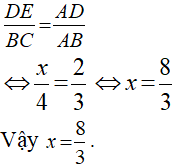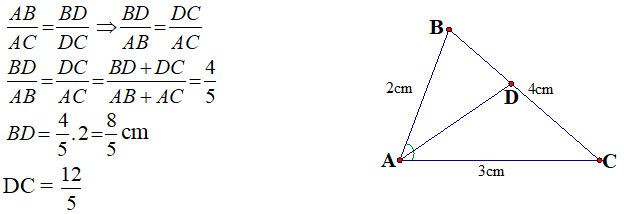Giải các phương trình sau:
a) x − 5 x − 1 + x + 5 x + 1 = 2 ;
b) 1 x − 1 − 2 2 − x = 5 x − 1 x − 2 ;
c) 3 x − 1 = 3 x + 2 1 − x 2 − 4 x + 1 ;
d) 1 x − 1 − 2 x 2 − 5 x 3 − 1 = 4 x 2 + x + 1 .
Bài 1: Giải các phương trình sau:
a) 3(2,2-0,3x)=2,6 + (0,1x-4)
b) 3,6 -0,5 (2x+1) = x - 0,25(22-4x)
Bài 2: Giải các phương phương trình sau:
a) \(\dfrac{3\left(x-3\right)}{4}\)+\(\dfrac{4x-10,5}{4}\)=\(\dfrac{3\left(x+1\right)}{5}\)+6
b) \(\dfrac{2\left(3x+1\right)+1}{4}\)-5=\(\dfrac{2\left(3x-1\right)}{5}\)-\(\dfrac{3x+2}{10}\)
Mik đang cần gấp nha!!❤
Bài 1: Giải các phương trình sau:
a) 3(2,2-0,3x)=2,6 + (0,1x-4)
<=> 6.6 - 0.9x = 2,6 + 0,1x - 4
<=> - 0.9x - 0,1x = -6.6 -1,4
<=> -x = -8
<=> x = 8
Vậy x = 8
b) 3,6 -0,5 (2x+1) = x - 0,25(22-4x)
<=> 3,6 - x - 0,5 = x - 5,5 + x
<=> - x - 3,1 = -5,5
<=> - x = -2.4
<=> x = 2.4
Vậy x = 2.4
Giải các phương trình sau:
a) \({2^x} = \frac{1}{{{2^{x + 1}}}};\)
b) \(2{e^{2x}} = 5.\)
\(a,2^{3x-1}=2^{-\left(x+1\right)}\Rightarrow3x-1=-\left(x+1\right)\Rightarrow x=\dfrac{1}{2}\)
\(b,ln\left(2e^{2x}\right)=ln5\)
\(\Rightarrow ln2+lne^{2x}=ln5\)
\(\Rightarrow ln2+2x=ln5\)
\(\Rightarrow2x=ln5-ln2=ln\dfrac{5}{2}\)
Như vậy \(x=\dfrac{1}{2}ln\dfrac{5}{2}\)
Giải các phương trình sau:
a) \(\dfrac{\sqrt{x+1}}{\sqrt{x-5}}=2\)
b) \(\sqrt[3]{x^2-1}=2\)
(a) Điều kiện: \(\left\{{}\begin{matrix}x+1\ge0\\x-5>0\end{matrix}\right.\Leftrightarrow\left\{{}\begin{matrix}x\ge-1\\x>5\end{matrix}\right.\Rightarrow x>5\).
Phương trình tương đương: \(\sqrt{x+1}=2\sqrt{x-5}\)
\(\Leftrightarrow x+1=4\left(x-5\right)\Leftrightarrow x=7\left(TM\right)\).
Vậy: \(S=\left\{7\right\}.\)
(b) Phương trình tương đương: \(x^2-1=8\)
\(\Leftrightarrow x^2=9\Leftrightarrow x=\pm3\).
Vậy: \(S=\left\{\pm3\right\}\)
a: ĐKXĐ: x+1>=0 và x-5>0
=>x>5
\(\dfrac{\sqrt{x+1}}{\sqrt{x-5}}=2\)
=>\(\sqrt{\dfrac{x+1}{x-5}}=2\)
=>\(\dfrac{x+1}{x-5}=4\)
=>4x-20=x+1
=>3x=21
=>x=7
b: ĐKXĐ: \(x\in R\)
\(\sqrt[3]{x^2-1}=2\)
=>x^2-1=8
=>x^2=9
=>x=3 hoặc x=-3
giải các phương trình sau:
a) x2+2x=(x-2)3x
b) x3+x2-x-1=0
c) (x+1)(x+2)(x+4)(x+5)=40
a) \(x^2+2x=\left(x-2\right).3x\)
\(\Leftrightarrow x^2+2x=3x^2-6x\)
\(\Leftrightarrow x^2+2x-3x^2+6x=0\)
\(\Leftrightarrow-2x^2+8x=0\)
\(\Leftrightarrow-2x\left(x-4\right)=0\)
\(\Leftrightarrow\left[{}\begin{matrix}-2x=0\\x-4=0\end{matrix}\right.\)
\(\Leftrightarrow\left[{}\begin{matrix}x=0\\x=4\end{matrix}\right.\)
Vậy S = {0;4}
b) \(x^3+x^2-x-1=0\)
\(\Leftrightarrow x^2\left(x+1\right)-\left(x+1\right)=0\)
\(\Leftrightarrow\left(x+1\right)\left(x^2-1\right)=0\)
\(\Leftrightarrow\left[{}\begin{matrix}x+1=0\\x^2-1=0\end{matrix}\right.\)
\(\Leftrightarrow\left[{}\begin{matrix}x=-1\\x^2=1\end{matrix}\right.\)
\(\Leftrightarrow\left[{}\begin{matrix}x=-1\\x=\mp1\end{matrix}\right.\)
Vậy: S = {-1; 1}
c) \(\left(x+1\right)\left(x+2\right)\left(x+4\right)\left(x+5\right)=40\)
\(\Leftrightarrow\left[\left(x+1\right)\left(x+5\right)\right]\left[\left(x+2\right)\left(x+4\right)\right]=40\)
\(\Leftrightarrow\left(x^2+5x+x+5\right)\left(x^2+4x+2x+8\right)=40\)
\(\Leftrightarrow\left(x^2+6x+5\right)\left(x^2+6x+8\right)=40\)
Đặt x2 + 6x + 5 = t
\(\Leftrightarrow t.\left(t+3\right)=40\)
\(\Leftrightarrow t^2+3t=40\)
\(\Leftrightarrow t^2+2.t.\dfrac{3}{2}+\dfrac{9}{4}=\dfrac{169}{4}\)
\(\Leftrightarrow\left(t+\dfrac{3}{2}\right)^2=\dfrac{169}{4}\)
\(\Leftrightarrow\left[{}\begin{matrix}t+\dfrac{3}{2}=\dfrac{13}{2}\\t+\dfrac{3}{2}=-\dfrac{13}{2}\end{matrix}\right.\)
\(\Leftrightarrow\left[{}\begin{matrix}t=\dfrac{13}{2}-\dfrac{3}{2}=\dfrac{10}{2}=5\\t=-\dfrac{13}{2}-\dfrac{3}{2}=-\dfrac{16}{2}=-8\end{matrix}\right.\)
\(\Leftrightarrow\left[{}\begin{matrix}x^2+6x+5=5\\x^2+6x+5=-8\end{matrix}\right.\)
\(\Leftrightarrow\left[{}\begin{matrix}x^2+6x=0\\x^2+6x+13=0\end{matrix}\right.\)
Mà: \(x^2+6x+13=x^2+2.x.3+9+4=\left(x+3\right)^2+4\ne0\)
=> x2 + 6x = 0
<=> x. (x + 6) = 0
\(\Leftrightarrow\left[{}\begin{matrix}x=0\\x+6=0\end{matrix}\right.\)
\(\Leftrightarrow\left[{}\begin{matrix}x=0\\x=-6\end{matrix}\right.\)
Vậy S = {0; -6}
a) Ta có: \(x^2+2x=\left(x-2\right)\cdot3x\)
\(\Leftrightarrow x\left(x+2\right)-3x\left(x-2\right)=0\)
\(\Leftrightarrow x\left[\left(x+2\right)-3\left(x-2\right)\right]=0\)
\(\Leftrightarrow x\left(x+2-3x+6\right)=0\)
\(\Leftrightarrow x\left(-2x+8\right)=0\)
\(\Leftrightarrow\left[{}\begin{matrix}x=0\\-2x+8=0\end{matrix}\right.\Leftrightarrow\left[{}\begin{matrix}x=0\\-2x=-8\end{matrix}\right.\Leftrightarrow\left[{}\begin{matrix}x=0\\x=4\end{matrix}\right.\)
Vậy: S={0;4}
b) Ta có: \(x^3+x^2-x-1=0\)
\(\Leftrightarrow x^2\left(x+1\right)-\left(x+1\right)=0\)
\(\Leftrightarrow\left(x+1\right)\cdot\left(x^2-1\right)=0\)
\(\Leftrightarrow\left(x+1\right)\cdot\left(x-1\right)\cdot\left(x+1\right)=0\)
\(\Leftrightarrow\left(x+1\right)^2\cdot\left(x-1\right)=0\)
\(\Leftrightarrow\left[{}\begin{matrix}\left(x+1\right)^2=0\\x-1=0\end{matrix}\right.\Leftrightarrow\left[{}\begin{matrix}x+1=0\\x-1=0\end{matrix}\right.\Leftrightarrow\left[{}\begin{matrix}x=-1\\x=1\end{matrix}\right.\)
Vậy: S={-1;1}
c) Ta có: \(\left(x+1\right)\left(x+2\right)\left(x+4\right)\left(x+5\right)=40\)
\(\Leftrightarrow\left(x+1\right)\left(x+5\right)\left(x+2\right)\left(x+4\right)-40=0\)
\(\Leftrightarrow\left(x^2+6x+5\right)\left(x^2+6x+8\right)-40=0\)
\(\Leftrightarrow\left(x^2+6x\right)^2+13\left(x^2+6x\right)+40-40=0\)
\(\Leftrightarrow\left(x^2+6x\right)^2+13\left(x^2+6x\right)=0\)
\(\Leftrightarrow\left(x^2+6x\right)\left(x^2+6x+13\right)=0\)
\(\Leftrightarrow x\left(x+6\right)\left(x^2+6x+13\right)=0\)
mà \(x^2+6x+13>0\forall x\)
nên \(x\left(x+6\right)=0\)
\(\Leftrightarrow\left[{}\begin{matrix}x=0\\x+6=0\end{matrix}\right.\Leftrightarrow\left[{}\begin{matrix}x=0\\x=-6\end{matrix}\right.\)
Vậy: S={0;-6}
1.Giải các phương trình sau:
a) 2x2 +16 -6 = 4\(\sqrt{x\left(x+8\right)}\)
b) x4 -8x2 + x-2\(\sqrt{x-1}\) + 16=0
2. Gọi x1;x2 là nghiệm phương trình x2 -3x -7 =0. Không giải phương trình tính các giá trị của biểu thức sau:
A = \(\dfrac{1}{x_1-1}+\dfrac{1}{x_2-1}\)
B= \(x^2_1+x_2^2\)
C= |x1 - x2|
D= \(x_1^4+x_2^4\)
E= (3x1 + x2) (3x2 + x1)
2:
\(A=\dfrac{x_2-1+x_1-1}{x_1x_2-\left(x_1+x_2\right)+1}\)
\(=\dfrac{3-2}{-7-3+1}=\dfrac{1}{-9}=\dfrac{-1}{9}\)
B=(x1+x2)^2-2x1x2
=3^2-2*(-7)
=9+14=23
C=căn (x1+x2)^2-4x1x2
=căn 3^2-4*(-7)=căn 9+28=căn 27
D=(x1^2+x2^2)^2-2(x1x2)^2
=23^2-2*(-7)^2
=23^2-2*49=431
D=9x1x2+3(x1^2+x2^2)+x1x2
=10x1x2+3*23
=69+10*(-7)=-1
giải các phương trình sau:
a) x(x-1)-(x^2-3x+5)
b) (x-5)^2+6x-30=0
c) x/x-2-1/x=2/x^2-2x
b: =>(x-5)2+6(x-5)=0
=>(x-5)(x+1)=0
=>x=5 hoặc x=-1
c: \(\Leftrightarrow x^2-x+2=2\)
=>x(x-1)=0
=>x=0(loại) hoặc x=1(nhận)
Bài 1. Giải các phương trình sau:
a) |4x2 - 25| = 0
b) |x - 2| = 3
c) |x - 3| = 2x - 1
d) |x - 5| = |3x - 2|
Lời giải:
a) $|4x^2-25|=0$
$\Leftrightarrow 4x^2-25=0$
$\Leftrightarrow (2x-5)(2x+5)=0$
$\Rightarrow x=\pm \frac{5}{2}$
b)
$|x-2|=3$
\(\Rightarrow \left[\begin{matrix} x-2=-3\\ x-2=3\end{matrix}\right.\Rightarrow \left[\begin{matrix} x=-1\\ x=5\end{matrix}\right.\)
c)
\(|x-3|=2x-1\Rightarrow \left\{\begin{matrix} 2x-1\geq 0\\ \left[\begin{matrix} x-3=2x-1\\ x-3=1-2x\end{matrix}\right.\end{matrix}\right.\)
\(\Leftrightarrow \left\{\begin{matrix} x\geq \frac{1}{2}\\ \left[\begin{matrix} x=-2\\ x=\frac{4}{3}\end{matrix}\right.\end{matrix}\right.\Rightarrow x=\frac{4}{3}\)
d)
$|x-5|=|3x-2|$
\(\Rightarrow \left[\begin{matrix} x-5=3x-2\\ x-5=2-3x\end{matrix}\right.\Leftrightarrow \left[\begin{matrix} x=\frac{-3}{2}\\ x=\frac{7}{4}\end{matrix}\right.\)
Bài 1. (3 điểm) Giải các phương trình sau:
a) (3x - 7)(x + 5) = (5 + x)(3 - 2x) 
giúp mình với mai thi rồi![]()
\(a,\left(3x-7\right)\left(x+5\right)=\left(5+x\right)\left(3-2x\right)\)
\(\Leftrightarrow\left(3x-7\right)\left(x+5\right)-\left(x+5\right)\left(3-2x\right)=0\)
\(\Leftrightarrow\left(x+5\right)\left(3x-7-3+2x\right)=0\)
\(\Leftrightarrow\left[{}\begin{matrix}x+5=0\\5x-10=0\end{matrix}\right.\)
\(\Leftrightarrow\left[{}\begin{matrix}x=-5\\x=2\end{matrix}\right.\)
\(b,\dfrac{-x+3}{2}=\dfrac{x-2}{3}\left(MSC=6\right)\)
Suy ra :
\(3\left(-x+3\right)=2\left(x-2\right)\)
\(\Leftrightarrow-3x+9-2x+4=0\)
\(\Leftrightarrow-5x+13=0\)
\(\Leftrightarrow x=\dfrac{13}{5}\)
\(c,\dfrac{x-1}{x-2}+\dfrac{5}{x+2}=\dfrac{12}{x^2-4}+1\)\(\left(dkxd:x\ne\pm2\right)\)
\(\Leftrightarrow\dfrac{\left(x-1\right)\left(x+2\right)+5\left(x-2\right)-12-x^2+4}{x^2-4}=0\)
\(\Leftrightarrow x^2+2x-x-2+5x-10-12-x^2+4=0\)
\(\Leftrightarrow6x-20=0\)
\(\Leftrightarrow x=\dfrac{10}{3}\)\(\left(n\right)\)
Vậy \(S=\left\{\dfrac{10}{3}\right\}\)
a | Áp dụng hệ quả của định lý Ta-lét ta có:  |
b | Ta có:  |
giải các phương trình sau:
a) \(x^2+4x+5=2\sqrt{2x+3}\).
b) \(3x^2+2x=2\sqrt{x^2+x}+1-x\).
\(a,\Leftrightarrow x^2+2x+1+2x+3-2\sqrt{2x+3}+1=0\\ \Leftrightarrow\left(x+1\right)^2+\left(\sqrt{2x+3}-1\right)^2=0\\ \Leftrightarrow\left\{{}\begin{matrix}x=-1\\2x+3=1\end{matrix}\right.\Leftrightarrow x=-1\left(N\right)\)
\(b,\Leftrightarrow3x^2+3x-2\sqrt{x^2+x}=0\left(x\le-1;x\ge0\right)\\ \Leftrightarrow3x\left(x-1\right)-2\sqrt{x\left(x+1\right)}=0\\ \Leftrightarrow\sqrt{x\left(x+1\right)}\left(3\sqrt{x\left(x-1\right)}-2\right)=0\\ \Leftrightarrow\left[{}\begin{matrix}x\left(x-1\right)=0\\\sqrt{x\left(x-1\right)}=\dfrac{2}{3}\end{matrix}\right.\\ \Leftrightarrow\left[{}\begin{matrix}x=0\\x=1\\x^2-x-\dfrac{4}{9}=0\end{matrix}\right.\\ \Leftrightarrow\left[{}\begin{matrix}x=0\\x=1\\9x^2-9x-4=0\left(1\right)\end{matrix}\right.\)
\(\Delta\left(1\right)=81-4\left(-4\right)\cdot9=225\)
\(\Leftrightarrow\left[{}\begin{matrix}x=0\\x=1\\x=\dfrac{9-15}{18}\\x=\dfrac{9+15}{18}\end{matrix}\right.\Leftrightarrow\left[{}\begin{matrix}x=0\left(N\right)\\x=1\left(N\right)\\x=-\dfrac{1}{3}\left(L\right)\\x=\dfrac{4}{3}\left(N\right)\end{matrix}\right.\Leftrightarrow\left[{}\begin{matrix}x=0\\x=1\\x=\dfrac{4}{3}\end{matrix}\right.\)
giải các phương trình sau:
a)2x(x-2)+5(x-2)=0
b)3x−42−4x+133x−42−4x+13
c)2xx−1−xx+1=1
a: =>(x-2)(2x+5)=0
=>x=2 hoặc x=-5/2
c: \(\dfrac{2x}{x-1}-\dfrac{x}{x+1}=1\)
=>\(\dfrac{2x^2+2x-x^2+x}{x^2-1}=1\)
=>x^2+3x=x^2-1
=>3x=-1
=>x=-1/3